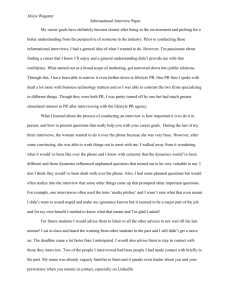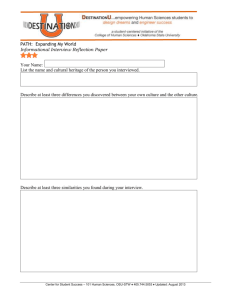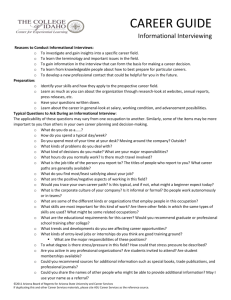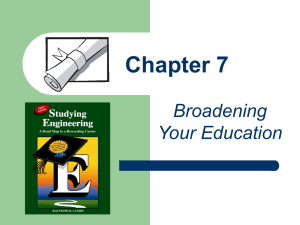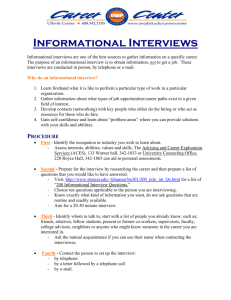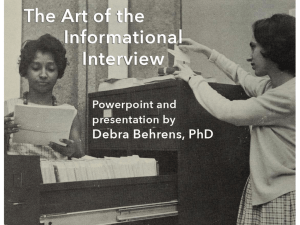Informational Interviewing booklet - Laurier Navigator
advertisement
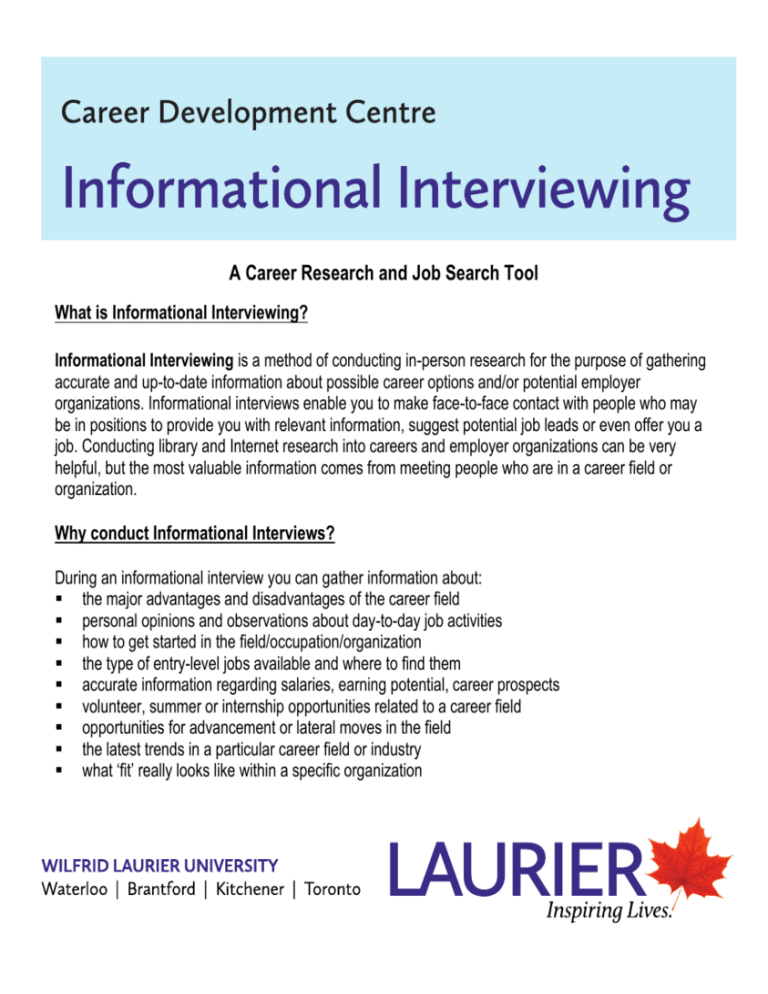
A Career Research and Job Search Tool What is Informational Interviewing? Informational Interviewing is a method of conducting in-person research for the purpose of gathering accurate and up-to-date information about possible career options and/or potential employer organizations. Informational interviews enable you to make face-to-face contact with people who may be in positions to provide you with relevant information, suggest potential job leads or even offer you a job. Conducting library and Internet research into careers and employer organizations can be very helpful, but the most valuable information comes from meeting people who are in a career field or organization. Why conduct Informational Interviews? During an informational interview you can gather information about: the major advantages and disadvantages of the career field personal opinions and observations about day-to-day job activities how to get started in the field/occupation/organization the type of entry-level jobs available and where to find them accurate information regarding salaries, earning potential, career prospects volunteer, summer or internship opportunities related to a career field opportunities for advancement or lateral moves in the field the latest trends in a particular career field or industry what ‘fit’ really looks like within a specific organization Although informational interviews are not job interviews, statistics show that while approximately one out of every 200 resumés results in a job offer, one out of every 12 informational interviews results in a job offer. – Quintessential Careers Informational interviews also provide you with a unique opportunity to: showcase your skills and professionalism demonstrate your interest and initiative clarify expectations and requirements build your confidence in speaking with potential employers observe working environments Step 1 – Research the Career Field First you need to know in which careers you are interested. Until you have identified your career options, you are not ready to begin this process. Prior to contacting organizations directly, do your research and gather basic information about the career field and the organization. The Career Centre can assist you with your personal career planning and has a variety of resources you can access to assist you with your career research and selection. Step 2 – Target Organizations and Professionals Begin by making a list of organization and people of interest that offer the type of work you are considering. Finding Potential Contacts To assist you in researching specific occupations and organizations, the Career Centre has developed the Alumni Sharing Knowledge (ASK) program. ASK provides students and graduates with the names of alumni from a variety of disciplines and occupational areas who are willing to share information on their careers and/or organizations. lauriercc.ca/career/alumni/connected/ask.htm Other resources to consider Employer/industry directories, brochures and events 2 Professional associations and publications Newspapers, magazines and industry journals Career fairs, Job fairs and networking events Professors or other professionals you know Organization websites Social Networking sites (e.g., LinkedIn, Facebook) Strategic Volunteering Consider becoming actively involved in professional or community organizations. Demonstrate your initiative by taking on roles in committees, boards of directors, special events planning and so on. Seek opportunities where you can develop your skills in decision making, planning, analytical thinking, team work, management and more. Step 3 – Initiate Contact Contacting a stranger to ask for a short meeting (not an interview) can be quite intimidating. However, if you are clear and specific about the kind of assistance or information you need, people generally want to be helpful. You are expressing interest in their chosen line of work and you are asking for their professional guidance to assist you in making important decisions in your life. You are not asking for a job, but the opportunity to learn from a professional. Connecting Through Email and Social Media Career experts often recommend email as the best form for requesting an informational interview. It tends to be less intrusive and allows you to write and refine a specific message. Unless you have been asked specifically to call, email may be the best starting point for initiating a contact. If you email your contacts, ensure that your correspondence is written in a professional manner. Introduce yourself and indicate your reason for connecting with them. Ask if they prefer email or telephone contact. If they are unavailable, ask if they could suggest another person to contact. Connecting by Telephone Before you make the call, have in front of you the organization’s name, the name of the person you are calling (if available), your script, your list of questions and paper and pencil. Do some research on the organization before you call. 3 Contact the people on your list. If you speak to the receptionist, identify who you are and to whom you wish to speak. If you are asked about the nature of your call, state that you are hoping he/she will assist you with some research you are conducting. You may be transferred from person to person. Be pleasant and patient with everyone, even if they are not. It may take several calls to connect with the right person. Be persistent because eventually it will likely pay off. Navigating Voice Mail If the target person is not available, or if you get voice mail, leave your number and briefly identify why you are calling (to set up a meeting, not to ask for a job). Indicate that you will call back at a later time, and ensure you make that follow-up call. This will allow you to maintain some control over the call, as opposed to waiting for someone to call you back. Requesting an Informational Interview Once connected to your target person, politely identify yourself and explain the purpose of your call. Ask if the person might have 15 minutes to meet with you (in person) to answer some of your questions (see the sample script to follow). Always try to set up an in-person appointment. Your goal is to see the work environment and to actually meet your contact. If an on-site appointment is not possible, you may request a telephone meeting. If asked, provide a suggestion of a date and time for the meeting (think of this ahead of time). Be flexible; remember the contact is doing you a favour. Make yourself available and set up a mutually-convenient appointment. 4 Sample #1 - Email or Telephone Script for Informational Interview Subject Line: RE: Request for Informational Interview Dear/Hello Mr./Ms. ________________________ (Who You Are) I am a student at Wilfrid Laurier University. I am currently conducting research on a variety of careers (or organizations) within the _____ field. (Why You Are Connecting With Them) Jane Smith indicated that you have enjoyed a successful career in this field (or organization) and I am interested in learning more about potential career paths. (What You Would Like To Happen Next) Would it be possible to set up an appointment to meet with you for 15 minutes so I could ask you a few questions about the _____ field (or your organization)? (Close) Thank you for your time and consideration of my request. I will call you next week to follow up. Sincerely, John Paul, BA Candidate 20XX John.paul@gmail.com 519.222.2222 Requesting a Referral for an Informational Interview If you receive a ‘no’ response to your request for an informational interview, or discover that the individual you have contacted is not the right person with whom you should speak, don’t give up. You can still request referral information. 5 Sample #2 - Script for Referrals (Following Sample #1 Guidelines) “Could you provide me with the name of someone who might be able to help me with this research?” When you get the name of another contact, follow up immediately and use the provider’s name: ”Good day, (person’s name). My name is ________. I was recently speaking with (contact’s name) of (organization) and he/she suggested that you might be able to help me with some research I am conducting...” Sample Questions for Informational Interviewing You should prepare your own relevant questions. The following are suggested questions to get you started. How did you decide to get into this field? What qualifications/education/training are required to get into this field? What would a typical day/week look like for you? What do you like best about this line of work/organization? What are some of the frustrations/difficulties you experience? What do you feel are the most important skills, interests and attitudes that would make a person satisfied with and/or successful in this job? What type of personality is best suited for this work? What do you feel is the best training route leading to this position? Could you describe some other environments where you might work? Are there similar or related occupations which require less/different training? What do you see as future trends for this occupation? What work/volunteer experience would benefit me in targeting this career area? Are there any professional associations I could join? Which would you recommend? What else should I be doing to increase my chances for success in this area? Publications? Events? Associations? Are there many opportunities for advancement in this field? Into what kinds of positions? What were some of the best decisions that you made as a student with respect to your professional life? Who were your mentors when you first graduated and began your career? Who are they now? Is there anyone else you would recommend to whom I could speak in a similar or related area who might give me another perspective? 6 Step 4 - Prepare For Your Interview Before going to your meeting, create and review a list of questions which address issues unique to the line of work you are considering. Be sure to actually take them along to the interview so you do not forget any important points. Prepare to answer questions about yourself and reasons for your interest in this field/career/organization which demonstrate some of your research. Also prepare a networking card to leave behind following your interview. Should you bring a resumé to an informational interview? Some experts say ‘Yes’ because it shows you are prepared for any outcome. Others say ‘No’ because you have told your contact that you are coming for information/research, not to apply for a job. If you are interested in working for the organization in the future, you could take a resumé and request feedback. If you are asked for a resumé and do not have a targeted one with you, you could say that you do not have a targeted resumé with you, but you would be pleased to drop one off. Going back may give you a second opportunity, however brief, to make another impression with a potential employer with a job-relevant resumé. Step 5 - Conduct The Informational Interview Confirm the meeting twenty-four hours in advance. Ensure that you arrive at least 10 minutes early for the interview. Dress and conduct yourself professionally as if you were at an actual job interview. Do not overstay your welcome. If you agreed to 20 - 30 minutes, track the time, indicate when the agreed-upon time has passed and be prepared to leave. Remember, this is your interview, so you will be expected to initiate the questions and facilitate the discussion. Thank the person for his/her time and ask if he/she can suggest anyone else in the field with whom you could meet to acquire other perspectives. Be sure to exchange business cards as you will need this information for follow up and they may use your information for future opportunities. 7 Step 6 - Follow Up After The Informational Interview Always send a brief thank-you letter to your contacts thanking them for their time and the information they were able to provide. Mention something you learned or found interesting about the meeting. If during the meeting you identified something that you can offer the interviewee (e.g., a professional contact, a resource, a useful link) ensure that you follow through with that suggestion. If during the course of your meeting you became aware of a suitable opening or opportunity, indicate your interest in being considered for that position. Keep track of whom you have met with so that you can refer back to your notes in the future and identify action steps in your career development. Building a network is important but maintaining it is crucial. Always ask the person if you may contact him/her again once you have made your career decision and begin an active job search. If the response is positive, be sure to reconnect every so often to give an update and seek additional information If you require assistance with career exploration, resumé and cover letter preparation, job search, interviewing techniques, further education preparation, please contact us: Waterloo, Kitchener, Toronto: 519.884.0710 x4495 Brantford: 519.756.8228 x5726 This document is available in an alternate or conversion-ready format
